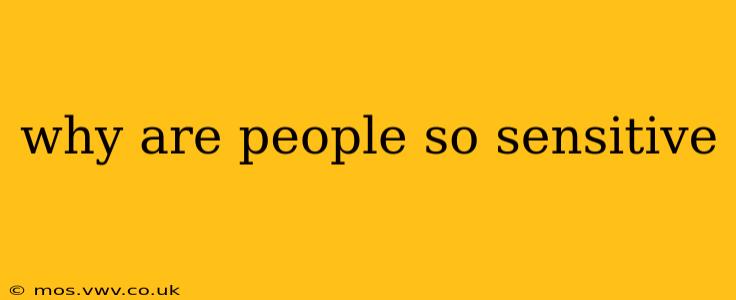Why Are People So Sensitive? Unpacking the Nuances of Emotional Sensitivity
The question, "Why are people so sensitive?" is complex, lacking a single, simple answer. Sensitivity itself isn't inherently negative; it's a spectrum, ranging from highly empathetic individuals deeply affected by others' emotions to those with heightened responses to sensory stimuli. Understanding the reasons behind perceived sensitivity requires exploring various contributing factors.
What Causes Heightened Sensitivity?
Several factors can contribute to a person appearing or feeling "too sensitive":
1. Temperament and Genetics: Some individuals are simply born with a temperament predisposed to greater emotional reactivity. Genetics play a significant role in shaping our emotional responses and thresholds for stress. This inherent sensitivity isn't a flaw but a personality trait.
2. Childhood Experiences: Early childhood experiences profoundly influence emotional development. Children who experience trauma, neglect, or inconsistent parenting may develop heightened sensitivity as a coping mechanism or due to altered brain development. For example, children who endured emotional neglect might struggle to regulate their emotions effectively later in life.
3. Neurological Factors: Certain neurological conditions, such as autism spectrum disorder (ASD) or anxiety disorders, can contribute to heightened sensory and emotional sensitivity. Individuals with ASD may experience sensory overload more easily, while anxiety disorders can amplify emotional responses to perceived threats.
4. Hormonal Fluctuations: Hormonal imbalances, especially in women due to menstruation, pregnancy, or menopause, can significantly impact emotional sensitivity and reactivity. These hormonal shifts can influence mood and emotional regulation.
5. Environmental Factors: Stressful life events, chronic illness, sleep deprivation, and even diet can all influence emotional sensitivity. When the body is under duress, the capacity to cope with emotional stimuli diminishes, potentially leading to heightened sensitivity.
Why Might Someone Appear More Sensitive?
It's crucial to distinguish between actual emotional sensitivity and perceived sensitivity. Sometimes, what seems like excessive sensitivity might stem from:
- Misinterpretation of behavior: A person's reactions might be misinterpreted as overly sensitive when, in reality, they are simply expressing their feelings or boundaries honestly.
- Social expectations: Society often pressures individuals to suppress emotions, leading to a judgment of those who openly express their feelings as "too sensitive."
- Lack of understanding: A lack of empathy from others can contribute to the perception of excessive sensitivity. When someone doesn't understand or validate another's feelings, the response may be perceived as overblown.
How Can We Better Understand and Respond to Sensitivity?
Empathy and understanding are crucial when interacting with those perceived as overly sensitive. Instead of judgment, we should strive to:
- Validate their feelings: Acknowledge the validity of their emotions without necessarily agreeing with their assessment of the situation.
- Practice active listening: Pay attention to both verbal and nonverbal cues, showing genuine interest in understanding their perspective.
- Respect their boundaries: Recognize that everyone has different levels of emotional tolerance and respect their need for space or time.
- Seek professional help: If sensitivity significantly impacts daily life, seeking professional help from a therapist or counselor can provide valuable strategies for emotional regulation and coping.
In conclusion, understanding why people exhibit heightened sensitivity requires considering a multitude of contributing factors, from genetics and childhood experiences to neurological conditions and hormonal fluctuations. Empathy, understanding, and validation are crucial in navigating interactions and fostering healthy relationships with those we perceive as "sensitive." Judging sensitivity as a negative trait ignores the complex interplay of biological, psychological, and social influences that contribute to individual differences in emotional responses.
